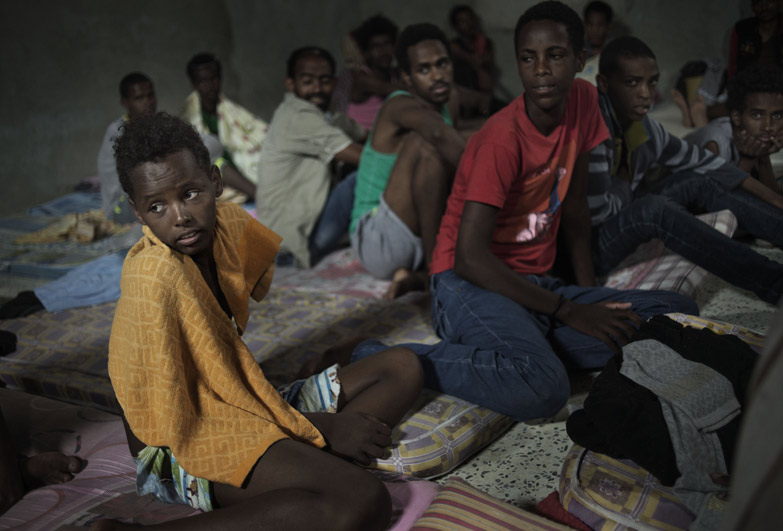Jakub Sobik on the the slave trade in Libya and what people can do to stop it.

8 December 2017
The recent scenes from Libya of men being sold as slaves at an auction recorded by CNN, have sent waves of horror and outrage around the world. Many people have been shocked to find out that what they imagined happened hundreds of years ago, is happening right now, in 2017.
Anti-Slavery has been raising the alarm about the potentially dire consequences of the migration crisis for the two years now. We have been calling on the international community, and European countries in particular, to do more to establish safe migration routes from African countries to Europe, and to invest more in the source countries to offer opportunities for people to provide for their families, rather than undertake horrifyingly dangerous journeys to the promised lands of Europe.
Yes, we are aware that immigration is a contentious issue in many European countries. But the alternative to simply preventing anyone from landing in Europe is the situation unfolding now in Libya, where people who try their luck get stuck there. The International Organization for Migration said in October that it had identified over 250,000 migrants in Libya, but estimated the true number to be between 700,000 and 1 million.
These individuals are stuck in a country where the UN-recognised Government has control only over a small proportion of the territory. There are rival governments, armed groups and militias, including the so called Islamic State, operating against a background of economic collapse and widespread lawlessness. In the absence of a functioning justice system, abductions for ransom; unlawful torture, detention and killing; sexual violence and slavery are committed with impunity.
What can be done?
It is sad that it takes such a horrifying media exposé to bring attention to the issue, but it is also heartening to see the response it has provoked from people across the world. So many people have got in contact with Anti-Slavery International to ask what they can do to help the situation in Libya, and we would like to sincerely thank everyone who has got in touch, donated to Anti-Slavery, or signed up for our updates.
Public pressure is what’s needed to make the UN and national Governments take action, and this is already having some effect. The UN, and some African and European Governments have already agreed an emergency plan to repatriate some migrants from Libya and to set up a task force to dismantle the trafficking networks.
We need this pressure to continue. In the short term, we are encouraging everyone who can, to attend the peaceful protest march to the Libyan Embassy in London on Saturday 9 December, to sign the petition to the UK Government asking parliament to debate the issue, and to write to your local MP to ask them to speak at the debate. If you are not in the UK, you can look online for any peaceful protests that may be going on in your country, sign the petition calling on the UN to take action, and write to your government representative.
In the longer term, we the need people like you – who refuse to accept the enslavement of human beings – to continue your support of our movement against slavery.
Slavery is a complex and interconnected issue that crosses borders, continents and social ills. Anti-Slavery works at both the grassroots level and the international level to fight against this abuse of human rights. It is the only way to bring a sustained end to this illicit practice.
- We support victims of slavery to leave it and build their lives away from slavery, as well as working with communities vulnerably to slavery to protect them from it. For example, we run projects in Mauritania, Niger, Tanzania and Senegal – some of the source countries where people caught up in Libya have migrated from.
- We work with governments and international decision makers and advocate for a united response to slavery across the world, from lobbying for laws against slavery to invest into programmes protecting vulnerable people from slavery. (Read about our recent successes here).
- We work with businesses in Europe to ensure their supply chains are free from forced labour.
All this is made possible by our supporters. Whether you have been part of the anti-slavery movement for a long time, or whether you have just joined us in the last few days – thank you for being part of the movement to end slavery for good.